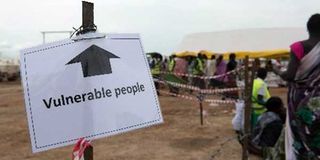Premium
Eva teaches the art of staying alive

A sign reading "vulnerable people" is seen as women wait in line for food distribution at the UNMISS POC (United Nations Mission in the Republic of South Sudan for the Protection of Civilians) site on June 26, 2014 in Tomping, South Sudan. Like many HIV-infected women I have met, Eva refused to die. And that is the art she is teaching her South Sudanese sisters. PHOTO/AFP
What you need to know:
- Most of the narratives I have heard follow a common thread: A clueless woman gets infected by her husband. I know that behind Eva’s black watery eyes and Dinka tattooed stripes on her forehead, there is a story.
- Our country had other pressing issues that concerned us. Aids wasn’t one of them. But a certain voice refused to leave my mind, telling me to get tested.
- “That is over 20 years ago. I’m still alive and I know I won’t die soon. I need to ensure that other South Sudanese women with this virus live positively, and as long as possible.”
Eva is HIV-positive. She is a resource person for the South Sudan Network of Women with Aids (SSUNEWA), which has been supportive in implementing HIV programmes. Rarely does Eva share her “HIV story”. She is a workaholic and always in meetings, always chasing after donors and deadlines and clients.
Every woman who is living with HIV has a story. Most of the narratives I have heard follow a common thread: A clueless woman gets infected by her husband. I know that behind Eva’s black watery eyes and Dinka tattooed stripes on her forehead, there is a story.
“How did you learn that you were HIV-positive?” I recently asked Eva, ignoring the 411 I have on her. I know she lost her husband and has two daughters. Her five sons were killed in the war. That is all I know.
LIVING A LIE
“I knew you would one day ask,” Eva says, surprising me. “Asunta, I tested HIV-positive in the eighties in Uganda. I lived there with my husband and two daughters.
“My husband had been sent to represent the South Sudan government, which was to split from the North and form its own republic. Most of the time he was busy and would return home very late, sometimes towards morning.
“One day, my husband fell ill and was unable to work. I had never seen him get ill before, even for one day. I thought he would get better and return to work, but within two months he was dead … by then he very thin. I never suspected that HIV could have contributed to his death.”
She continued, “I had been faithful to him throughout our marriage and assumed that he had been too. Once, I heard a rumour that he was having an affair with a woman whose husband had died of Aids. When I mentioned it, he assured me that he didn’t have time for an affair, that the rumours were just malice.
“I had no reason to doubt him. Even when he died, not once did I think of Aids. One day, my daughter came home crying. When I asked her why, she told me she wouldn’t go to school again because everyone was saying that her father had died of Aids, and that soon, I too would die.
“I couldn’t believe what I was hearing. Although I knew there are many Aids cases in Uganda, I never thought we would be affected. We were Sudanese. Our country had other pressing issues that concerned us. Aids wasn’t one of them. But a certain voice refused to leave my mind, telling me to get tested.
“I went to a private clinic one evening. The doctor said they couldn’t do the HIV test because the counsellor wasn’t around. I insisted. Told him I knew I didn’t have HIV. I only wanted to confirm my negative status. I remember I didn’t even go to the lab. The doctor did the test at the reception, as I’d found him on his way out.
POSITIVE RESULTS
“The HIV test turned positive. I cried and screamed. I don’t know how I got home, but when I did, I picked up a machete and went straight to my husband’s grave, which I started hacking. I wanted him to explain to me why he did this to me and our children. He knew I had lost all my sons in the war, and now he had brought me Aids. Why? I needed answers that only he could provide.”
Eva was taken to a psychiatrist hospital, where she stayed for over a month. After some time, she accepted her HIV status, packed all her belongings, and returned to Sudan so she could die near her people, as she puts it.
“That is over 20 years ago. I’m still alive and I know I won’t die soon. I need to ensure that other South Sudanese women with this virus live positively, and as long as possible.”
Like many HIV-infected women I have met, Eva refused to die. And that is the art she is teaching her South Sudanese sisters.





